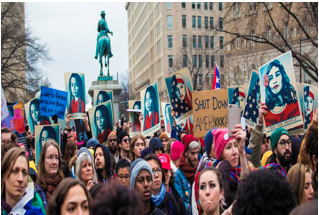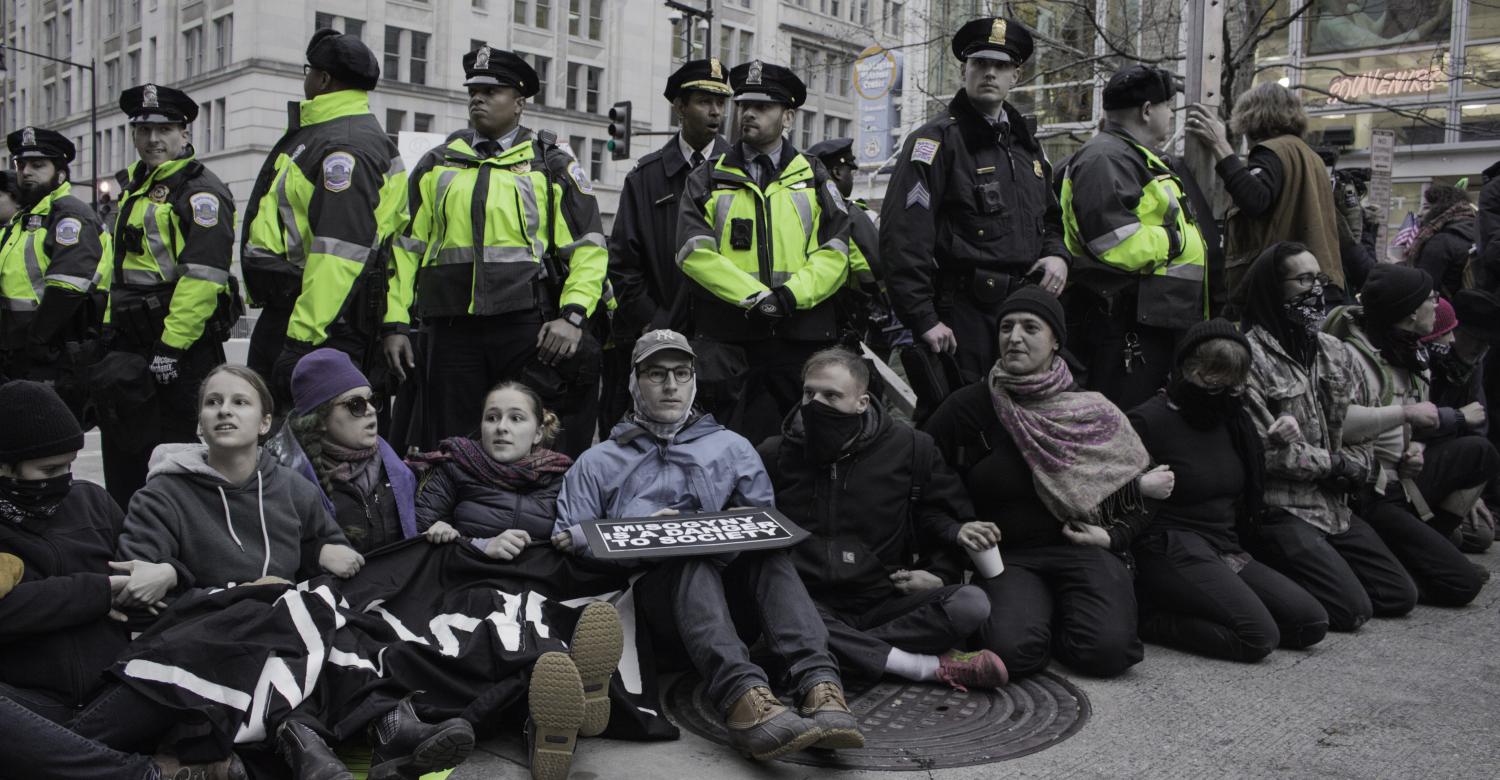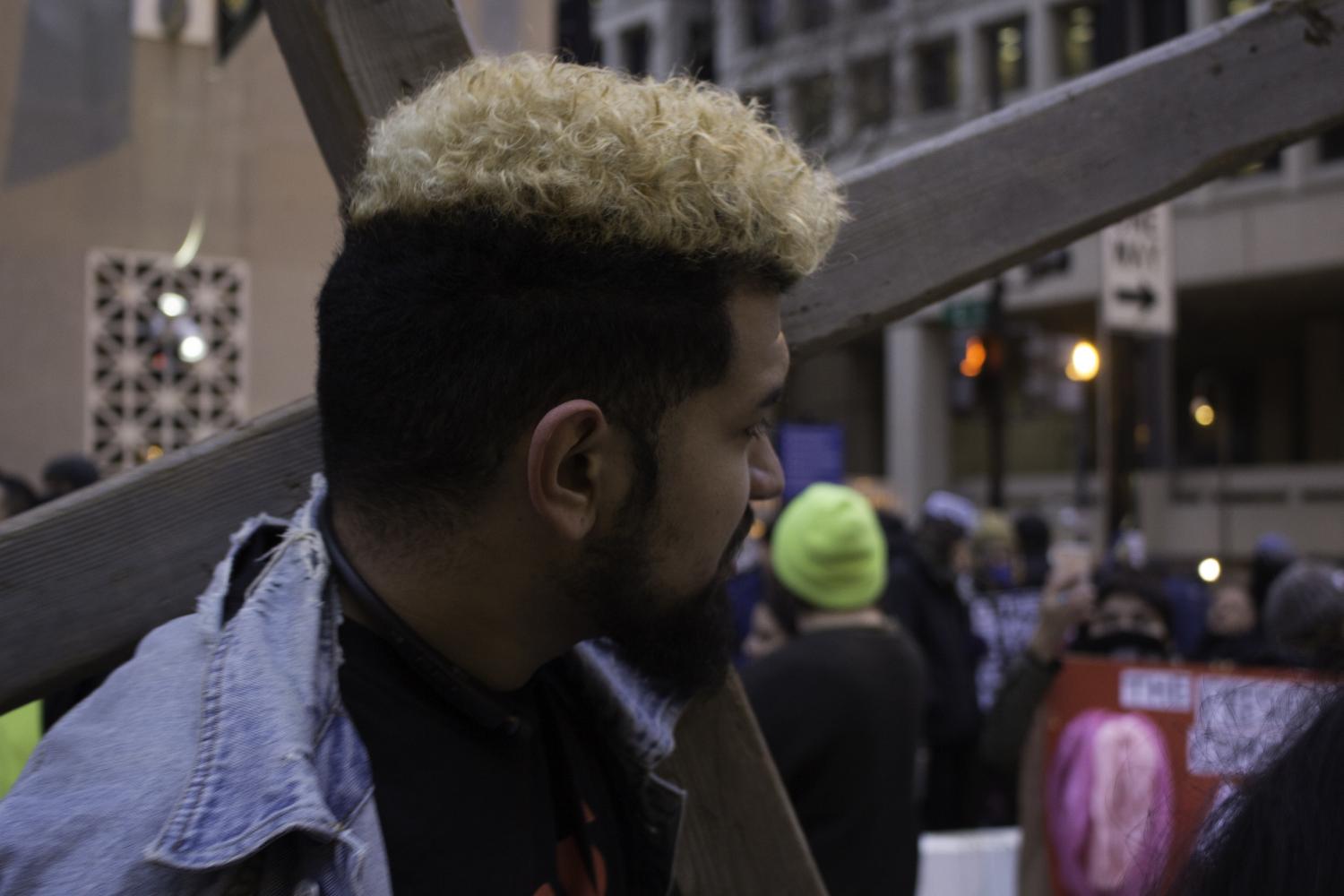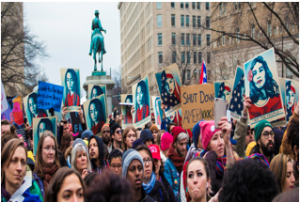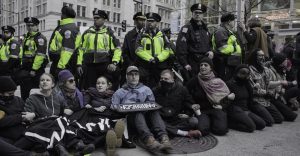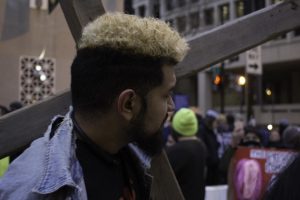Tensions Flare, Protestors Unite

Xan Joi is a 66-year-old, self-described protest-chaser. She has been attending various protests for the past few months throughout the country- from Standing Rock in North Dakota to the border fence in El Paso, Texas to the Sable Trail pipeline in Florida, and finally the 2017 presidential inauguration.
In the various protests against Donald Trump’s inauguration today in Washington, D.C., she stood out amongst the crowd with her ‘no pipeline’ logo sticking out of her back pack, while holding a giant pink umbrella that says ‘no fucking fracking.’
“I am speechless… I thought Bush would be our worst president. I’m shocked that so many people are still holding on to racism,” Joi said.
The protesters gathered together, screaming chants like ‘When Muslims communities are under attack, what do we do? Stand up, fight back.’ and ‘No pussy grabbing, no patriarchy, no sexist USA.’ The protest took place near a security checkpoint that allowed people with tickets to enter the inauguration site. Police were present to ensure no violence was occurring between the two groups.
However, the protesters seemed to be interfering. As the officers tried to push the crowd back, protesters did not move. This led to officers spraying mace to get everyone to move, and tensions between the officers and protesters quickly rose.

Men dressed in paramedic like uniforms came to aid a man who was sprayed in his eyes. As they poured water in his eye to relieve the burn, protesters entangled their arms to one another, forming a human blockade in front of officers. They screamed: “This is what a police state looks like.”
“I am thrilled that so many people are willing to put their bodies on the line for this,” Joi said.
However, some protesters felt officers were getting unnecessarily hostile.
“This is so disturbing to me. I think this [is] a really peaceful protest,” said Elena Egudwuiza, a protester from Pittsburgh.
“To see this reaction is jarring.”

As the situation eased slightly, a woman went around advising people to sit down whenever officers seemed agitated, which would help de-escalate the situation. Chants became more animated again, and people started dancing when a band from New York began performing.
To further lighten the mood, Austin Medina came to the protest carrying a large wooden cross with him as he talked to various people. He came to spread the message of love and faith to both officers and protesters.
“I came here because I love Jesus. He told me to come here,” Medina said.

Trump supporters did not seem to be bothered by the surrounding protests. Many people said the protesters had a right to express their opinions, although they wished it did not involve blocking entrances. As Trump supporters stood in line to get to the inauguration site, many expressed hope and change for the economy.
Tina White, a retired nurse practitioner from New York, even started her own business after President Trump won in November. In 2012, she came to D.C. to protest Obama’s inauguration.
“I know the economy will take off with Trump as president.” White said.
“It already has, and it will continue to rise.”
Despite the clashes between Trump supporters and protesters, the sense of passion and drive that came from both sides was evident. Crowd members came from all backgrounds, raising signs, chanting for rights, passing out coffee and water to one another. Despite cultural, ethnic and class differences, there was a sense of unity amongst the protesters and supporters.
The cohesion amongst protesters was comforting for Carla Alegria, a woman who identifies as a queer person of color.
“I feel scared, but I also feel inspired,” Alegria said.
“But you have to go ahead, and fight on anyways.”
Alegria came from California to attend protests as part of the Freedom Socialist party. She was born in El Salvador, and lived there until she was 13-years-old. When she was 8, her mother immigrated to the U.S. after the manufacturing company she worked for closed down. Alegria was separated from her mom for 5 years before reuniting with her in the U.S.
“There are no resources in many people’s home countries. They have to go where they can survive,” Alegria said.
“They come here and do the shitty jobs that no one else wants to do.”
But seeing all these people fight for minority rights, women’s rights, LGBTQ rights, made Alegria feel supported.
“That’s what I need. People who are going to stand up when I fall down,” Alegria said.
Photo credits: Bruna Weichert


